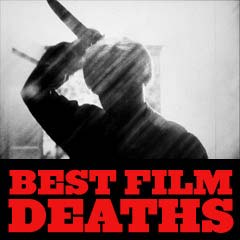
|
Deaths Scenes 1969-1970 |

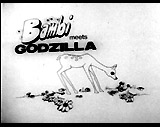
|
Bambi Meets Godzilla (1969) (short) Bambi was brutally stomped to death - the punchline in this very short film - made by a student at the Art Center of Design in Los Angeles. |

|
||||||
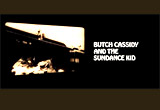
|
Butch Cassidy and the Sundance Kid (1969) George Roy Hill's entertaining, whimsical, hit production of the comedy/drama western was about two legendary, turn-of-the-century Western outlaws faced with inevitable changes in the twentieth century. Outlaws Butch Cassidy (Paul Newman) and the Sundance Kid (Robert Redford) made an heroic last-stand charge - punctuated by a freeze-frame and transformation to sepia. After being forced to retreat after blistering gunfire surrounded them, they decided to emerge with guns blazing from their hiding place for their last stand shootout against impossible and insurmountable odds in the courtyard. They were drowned out by the merciless sounds of thousands of guns firing on them from all angles. Rather than ending the film in bullet-ridden deaths, the picture ended with the well-known freeze-frame of their final charge - mythologizing and immortalizing the two for posterity. The image froze, blurred, and then kept a sepia-toned focus on the legendary, eternal bravura image of the two compadres in their final moments as they met their fate together. |
  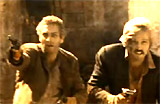 Freeze-Framed, Sepia-Toned Ending |
||||||
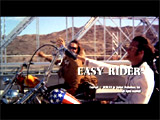
|
This was a late 1960s "road film" tale of a search for freedom (or the illusion of freedom) in a conformist America. Two self-righteous, anti-hero, free-wheeling, long-haired, social misfits were on a journey of discovery on their motorbikes - journeying eastward:
The ending of the film was remarkably bleak, cynical and fatalistic. Middle America's hatred for the long-haired cyclists was shown in the film's famous ending. On one of the last stretches of roadside where American industry had not yet sprawled, two armed rednecks (David C. Billodeau and Johnny David) in a small pickup truck thought they'd have some fun with the two hippie bikers (Arnold: "We'll scare the hell out of 'em"). When one of the rednecks named Arnold pointed a shotgun at Billy, and remarked: "Do ya want me to blow your brains out?", the long-hair obscenely gestured with his 'finger'. Arnold then taunted: "Why don't you get a haircut?" and then a sudden shot-gun blasted Billy in the stomach and he was mortally wounded. His bike rolled and skidded down the road. Captain America-Wyatt stopped and turned back toward Billy to help him. When Wyatt sped down the road to seek help for his dying friend, the rednecks had turned around and were driving toward him - gunfire again blasted through the window and Wyatt's bike flew through the air. [Significantly, Wyatt's dead body didn't appear in the final scene.]
The closing image (of an earlier flash-forward) was a pull-back aerial helicopter shot floating upwards above Wyatt's motorcycle which was burning in flames by the side of the road. Death seemed to be the only freedom or means to escape from the system in America where alternative lifestyles and idealism were despised as too challenging or free. The romance of the American highway turned menacing and deadly. |
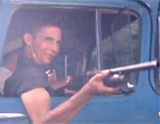 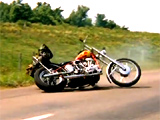 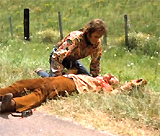 The Death of Billy 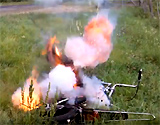 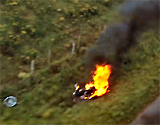 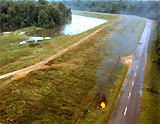 Wyatt's Burning Bike |
||||||
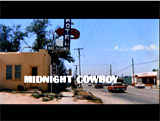
|
Director John Schlesinger's acclaimed, originally X-rated drama, a Best Picture winner, was an account of the unlikely friendship that developed between two 'hustlers' in New York City:
In the final sequence, Joe frantically dragged Ratso to a bus bound for sunny Florida, using the last of their money to pay the bus fare and help realize Ratso's dream of moving there. To the end, Ratso wanted to maintain his dignity and insisted on being called "En(Rico)" in Florida. From New York and venturing southward to his dream, Ratso wet his pants and his body was wracked with pain:
Joe consoled him with a cheerful joke: "...You just took a little rest stop that wasn't on the schedule." During an extended rest stop in northern Florida, Joe bought new warm weather clothes for the two of them, and symbolically discarded his own 'midnight cowboy' costume/gear (boots, fringe jacket, hat) in a trash container. As they approached the environs of Miami, he had dressed Ratso in a new, more comfortable flowery shirt, telling him:
Joe pondered the way things would be once they arrived into Miami, thinking of more mature, realistic and positive opportunities for work. His faith had been restored - the major result of his deep friendship with Ratso - and for the first time in the film, he abandoned the name Ratso and called his friend Rico:
His rhetorical affirmations for his future fell on deaf ears. As palm trees and views of endless beaches passed by the window, Joe realized that his best buddy had passed away - Rico was finally at peace without any more pain. [Both Joe's naive dream of life in New York and Rico's dream of paradise in Miami were ultimately unrealized and unfulfilled.] When Joe informed the driver about Rico, the bus driver (Al Stetson) pulled over, walked to the back of the bus, asked Joe to reach over and close Rico's eyes, and reassured Joe and the other passengers:
Joe, with tears forming in his eyes, affectionately wrapped his arm around Rico's shoulder and held him. Joe would now face life alone without the aid of his pal to guide him through, but he had learned his limitations and true potential from his friend. Palm trees were reflected on the window glass - in a view from outside the bus, as the film slowly faded to black and ended. |
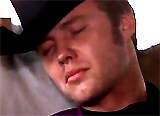 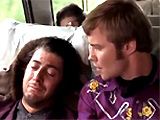 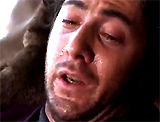 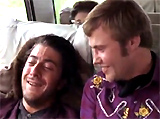 "You just took a little rest stop that wasn't on the schedule." 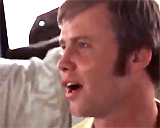 "I got this damn thing all figured out..." 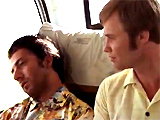 First Realization That Rico Was Dead 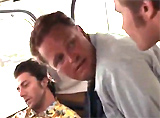 Checked Out by Bus Driver 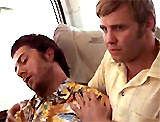 "Just a little illness." 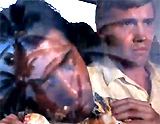 A Reflection of Palm Trees |
||||||

|
On Her Majesty's Secret Service (1969, UK) The famous but tragic ending of this sixth James Bond film involved:
They were speaking about having a family ("three girls, three boys"), as they drove away for their honeymoon in his flower-adorned Aston Martin DBS car. He assured her: "But darling, now we have all the time in the world." When Bond parked the car on the side of the mountain road to remove some flowers to give to her, she mentioned that the best wedding present she had already received was "a future." He kissed her with a flower between her lips. Suddenly without warning, MP-40 submachine gun fire from a passing silver Mercedes 600 sedan strafed their car, and then drove away. SPECTRE villain Ernst Stavro Blofeld (Telly Savalas), with a neck brace, was driving the vehicle in the attempt on Bond's life in a drive-by shooting -- his henchwoman Irma Bunt (Ilse Steppat) had fired the shots from the back seat of the sedan. Bond ducked and avoided being hit. He shouted twice: "It's Blofeld" as he jumped into his car. He then realized that Tracy had been hit in the forehead by a bullet through the windshield and instantly killed. He cradled her in his arms, and at first denied her death to a police officer on a motorcycle:
Bond's mournful words were underscored by Louis Armstrong's beautiful and ironic rendition of "We Have All the Time in the World." |
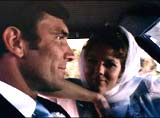 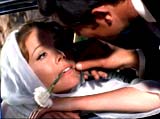 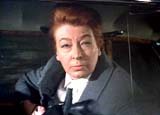 Assassin Irma Bunt 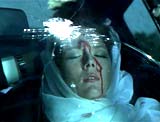 Tracy's Death 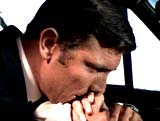 "We have all the time in the world." |
||||||
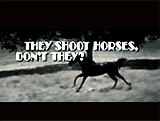
|
They Shoot Horses, Don't They? (1969) In the film's surprise ending, Depression-era marathon contestant Gloria Beatty (Jane Fonda) was depressed about her life and felt hopeless. She confided in her dance partner Robert (Michael Sarrazin) outside the music-hall late one night:
She removed a gun from her purse, to end her life. When she was unable to suicidally kill herself by pulling the trigger, she begged Robert to oblige ("Help me, oh please, please!"). He instructed her: "Tell me when," and then held the gun to her temple. When she responded: "I'm ready...now," he looked away and pulled the trigger. She imagined herself falling in a grassy field. Sirens were heard, and an ambulance loaded her body onto a stretcher. Robert was asked by a policeman why he did it - he answered:
It was a humane 'mercy killing' similar to putting horses out of their painful misery. |
 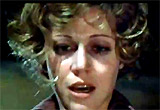 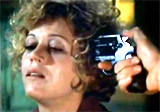  Mercy Killing: "I'm ready... now." |
||||||
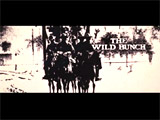
|
Sam Peckinpah's harsh and extremely violent western cinematically visualized at both its beginning and end (with rapid-fire and slow-motion segments) the horrific, savage, yet glorified spectacle of death for a romantic band of men whose time had come. Leader Pike Bishop (William Holden) knew he must lead his Wild Bunch group to uphold its honor, to live up to its pronouncements on solidarity, to commit itself to a futile but necessary action, and to nobly sacrifice itself for the persecuted and captive Angel (Jaime Sanchez) - in a final showdown against 1,000 Mexicans. The four Wild Bunch members loaded their rifles and marched across town - four abreast, reminiscent of the walk to the classic O.K. Corral in other westerns - to confront the drunken General Mapache (Emilio Fernandez), who held court next to the machine gun, his proud possession mounted on a table. Pike demanded the return of Angel ("We want Angel"), now bloodied, maimed and near-death from torture. Mapache appeared to comply, assisting Angel's walk over to them and then cutting his wrist ties with a knife. But in a brutal, full-frontal view, Mapache slit Angel's throat and was immediately killed in retribution by Pike and then by Dutch (Ernest Borgnine) and Lyle Lorch (Warren Oates).
The precipitation of their last stand - a violent, seven minute bloodbath counter-attack of monumental proportions in the open courtyard - was delayed with a long moment of silence. With their guns drawn, the four men were able to hold off hundreds of surprised and dumbstruck Mexicans, which now stood leaderless and still for several seconds, gaping at what had happened. Warily and then gleefully, Pike and Dutch smiled and laughed, realizing that for an instant, they just might succeed. However, in the end, they were outnumbered, surrounded, and condemned to die in the pending climactic battle. It was truly an orgy of slaughter in one of the bloodiest scenes ever filmed, as the four remaining outlaws took down as many men as they could. Although some of the Wild Bunch held off the troops momentarily by using grenades and by commandering the machine gun and firing it with orgasmic intensity, they were soon wounded and killed. With their violent deaths, they had become liberated. |
|
||||||
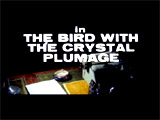
|
The Bird with the Crystal Plumage (1970, It.) (aka L'Uccello dalle piume di cristallo) Dario Argento's directorial debut was this plot-twisting thriller. Its opening Hitchcockian Psycho-like scene showed an unidentified cackling serial killer 'apparently' brutally slashing victim Monica Ranieri (Eva Renzi), the beautiful wife of art gallery owner Alberto Ranieri (Umberto Raho). The bloodied victim struggled to survive the black-raincoated killer's assault. Her perspective was revealed with POV shots, as she pleaded for help from a nearby witness Sam Dalmas (Tony Musante), an American writer living in Rome, who was trapped between two glass doors outside of the modern art gallery. Monica was not killed, but only wounded and she survived the attack. However, there were more murders of pretty women:
And then during a struggle between Alberto and Monica, with a knife between them, the authorities heard screams and entered their locked apartment. When efforts were made to apprehend Alberto, he was knocked backward from the balcony, and after dangling there for a minute, fell to his death six stories down onto the sidewalk below. As he lay dying, he confessed to the murders:
But in the film's twisting, final revelation, Monica was discovered to be the serial killer, who had slashed both the 4th and 5th victims, and also murdered her husband Alberto by pushing him to his death from a six-story building. |
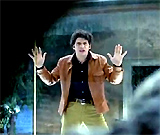 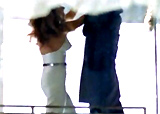 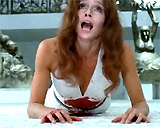 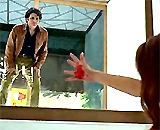 The Opening Assault in the Art Gallery 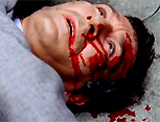 Death of Alberto and His Confession: "I am the Murderer" |
||||||
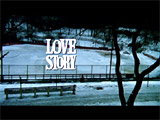
|
One of the weepiest, most melodramatic death scenes occurred in this sequence. It featured the untimely, early death of incurable, terminally-ill Jenny Cavalleri Barrett (Ali McGraw) in her hospital room. She had a lengthy deathbed conversation with husband Oliver Barrett IV (Ryan O'Neal) at the Mount Sinai Hospital in a tear-inducing closing. She told him:
He stated he fell off a cliff when he met her. Then, she tried to bring up his spirits:
He finally admitted: "I believe you. I really do." She responded: "That's better." She then made her last request to be in his arms before her death:
He reclined next to her on the bed. Afterwards, in the hallway, Oliver spoke to Jenny's father Philip (John Marley), who said with a choked-up voice:
As he left the hospital, he ran into his father Oliver Barrett III (Ray Milland), who asked: "Why didn't you tell me? I made a couple of calls, and as soon as I found out, I jumped right in the car. Oliver, I want to help." Oliver simply replied: "Jenny's dead." When Oliver's father began to reply: "I'm sorry...", Oliver interrupted him and quoted his late wife's earlier remark, when referring to their past misunderstandings (it was the last line of film dialogue):
For the remaining three minutes in the touching finale, Oliver walked across the street to snow-covered Central Park as the poignant, award-winning "Love Story" theme music built up and played and he contemplated what life would have been like with Jenny, while sitting on a bench. The camera pulled away from him, shot from behind, before the closing credits. |
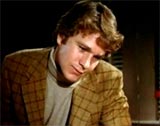  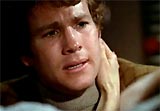 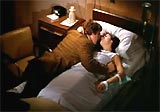 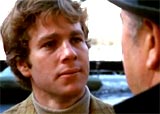 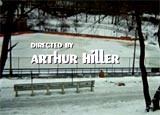
|
||||||
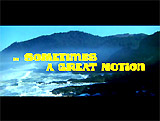
|
Sometimes A Great Notion (1970) Star Paul Newman directed this action-adventure drama about a stubborn rural family known as the Stampers, led by patriarchal Henry Stamper (Henry Fonda), living in the town (fictional) of Wakonda, Oregon in the early 1960s. The story was based upon Ken Kesey's 1964 second novel of the same name. The Stampers were a group of independent, non-unionized loggers struggling to keep their family business, against the pressurizing forces of striking unionized workers during a bitter labor dispute. The family was also threatened by rising waters and tides. Joe "Joey" Ben Stamper (Oscar-nominated Richard Jaeckel), Henry's nephew, died by slow and inevitable drowning while trapped under a huge log. There were frantic efforts to save him by his elder brother Hank (Paul Newman), using mouth-to-mouth resuscitation (under the water) during the gripping and moving death scene. |
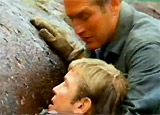 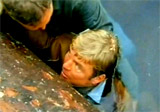 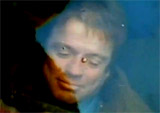 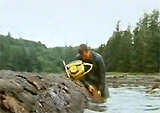
Drowning Under a Huge Log |
||||||
(chronological by film title) Intro | 1915-1929 | 1930-1933 | 1934-1938 | 1939 | 1940-1942 | 1943-1945 | 1946-1947 | 1948-1949 1950-1952 | 1953-1955 | 1956-1957 | 1958-1959 1960-1961 | 1962-1963 | 1964-1966 | 1967-1968 | 1969-1970 1971 | 1972 | 1973 | 1974 | 1975 | 1976 | 1977-1978 | 1979 1980 | 1981 | 1982 | 1983 | 1984 | 1985 | 1986 | 1987 | 1987 | 1988 | 1989 1990 | 1991 | 1992 | 1993 | 1994 | 1994 | 1995 | 1995 | 1996 | 1997 | 1998 | 1998 | 1999 2000-2001 | 2002 | 2003 | 2004 | 2005 | 2006 | 2007 | 2008 | 2009 | 2010 | 2011 |